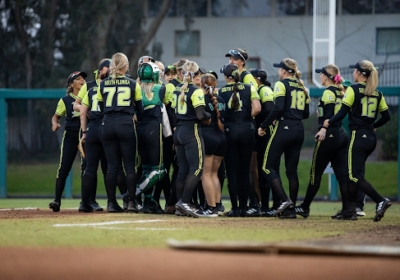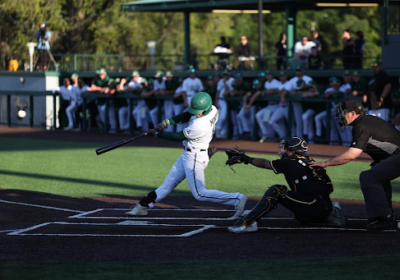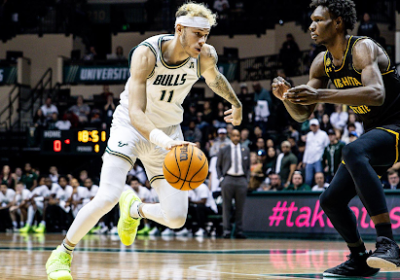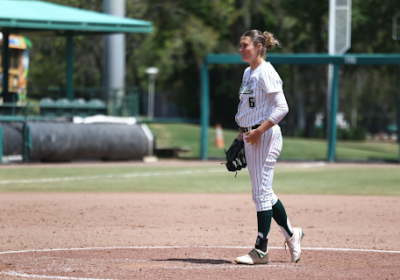OPINION: USF Football postseason takeaways

USF bowl game offensive coordinator Justin Burke consoles quarterback Blake Barnett after losing to Marshall in the Gasparilla Bowl on Thursday. USF became the first team in college football history to finish a season 7-6 after starting 7-0. ORACLE PHOTO/BRIAN HATTAB
USF football was defeated by Marshall 38-20 in the Gasparilla Bowl on Thursday at Raymond James Stadium. The loss dropped the Bulls to 7-6 after starting the season 7-0.
USF became the first team in college football history to finish a season 7-6 after starting 7-0.
It’s tough to wrap-up a season like this in one article, because for as many highs — such as the thrilling defeat of Georgia Tech on Sept. 8 — there were as many, if not more, lows — such as being blown out by Tulane at home on Nov. 3.
Were expectations too high?
There’s no doubt that starting the season 7-0 only to finish things 7-6 is bad. But the expectations may have been a bit too high for a team that lost, among others, the best player it ever had in Quinton Flowers.
“We lost probably one of the best players in the history of this program,” coach Charlie Strong said. “You lost a receiver who is starting right now for the Green Bay Packers (Marquez Valdes-Scantling), you have four guys on defense that are on an NFL roster that are playing — [Deadrin] Senat is starting. So when you lose those players and you have to go replace them, it’s really tough to replace some of those players.”
There’s truth to what Strong said. While the expectation was an AAC championship — or, at least being in competition for the AAC championship at the end of the season — maybe seven wins is about right for a team that lost a ton of talent after last season.
Most preseason predictions from outside the program had USF at eight wins and there are a good number of moments in the six-game slide that can be pointed at as the difference between seven and eight wins.
The QB2 battle was dumb
Heading into fall camp, nobody knew who the starting quarterback would be. It was a three-man race between Blake Barnett, Brett Kean and Chris Oladokun.
Barnett, the former five-star recruit by Alabama, eventually won the starting job — and nobody ever won the No. 2 position on the depth chart.
Why?
When Barnett went down, nobody knew who was next man up.
It led to Oladokun and Kean splitting time against both Cincinnati and UCF, with neither really able to get into a rhythm.
Now-former offensive coordinator Sterlin Gilbert had plenty of chances to name a No. 2 and didn’t. It made no sense and may have been a large factor in the downward spiral that the Bulls found themselves on in the latter part of the season.
This sort of leads into the next point.
The offense was bad considering the weapons it had
The offensive unit was absolutely hampered by the ultra-conservative playing calling from Gilbert.
It was so bad that former players, such as Valdes-Scantling, were openly critical of the play calling on Twitter during a number of USF games this season.
Gilbert refused to explain his ways either — at one point in the season declining to “talk Xs and Os” after a questionable play call on a two-point conversion against Tulsa.
An offense with Blake Barnett behind center, Jordan Cronkrite and rising star Johnny Ford in the backfield, Tyre McCants and Randall St. Felix at wide receiver and Mitchell Wilcox at tight end should never have struggled as much as it did this season.
Hopefully whoever replaces Gilbert, whether it be bowl game play-caller Justin Burke or someone else, can take an offense with plenty of returning talent to the level where it is perfectly capable of being.
A lot of defensive guys were playing out of position
Lost in the agony of a six-game losing streak to end the season is the sheer number of defensive players that had to play out of position due to injury.
“It was a huge adjustment period, especially personally,” said Greg Reaves, a natural defensive end turned linebacker. “First, learning the position. There’d be times during the games I would see a guy running, I’d be like, ‘Is that me?’ … And then, also, getting the chemistry with the guys around you. So knowing where everybody’s going to be — knowing how you’re going to fit.”
It’s easy to look at stats and shake your head at the defensive effort, but turning Reaves from a defensive end to a linebacker was not an easy task. Neither was turning Khalid McGee from a safety to a linebacker.
In an ideal world, everyone would play their natural position. But this is the reality of college football. A team can’t go out and sign replacement players midseason like in the NFL, so it needs guys to step up at times. But there will always be growing pains associated with that.
Losing this bowl game changes nothing
Winning the Gasparilla Bowl wouldn’t have changed the fact that USF lost five straight games after starting the season 7-0. Whatever changes that need to happen would still have needed to happen, even if USF dominated Marshall.
As Taylor Swift once said, “Band-aids don’t fix bullet holes,” and the Gasparilla Bowl trophy would have been a treasure chest-sized band-aid covering up the gaping bullet hole of a five-game losing streak.
Relax.
Changes are coming. They have to. This was an embarrassing end to a season that began with championship ambitions.
Strong will be back next season if he still wants to be here. He will pick who he feels is the right person for the vacant offensive coordinator position, whether it is from inside the program or not.
As far as the rest of the program goes, Strong and Vice President of Athletics Michael Kelly will take a long, hard look at everything.
But the fanbase needs to relax for the time being. Changes, when they come, will be incremental. Strong and Kelly are not the kind to make rash decisions based purely in passion.
Trust the process.






